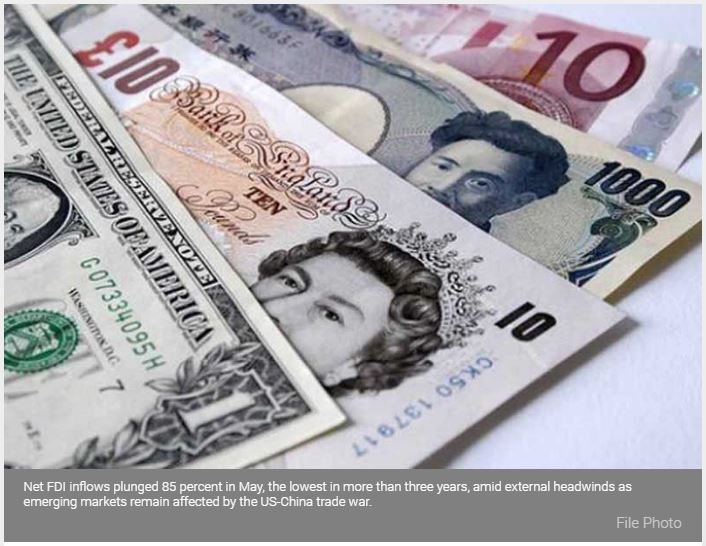Philippines: ‘CITIRA, easing foreign ownership crucial to FDI recovery’
MANILA, Philippines — The immediate passage of the CITIRA (Corporate Income Tax and Incentives Rationalization Act) bill and the further easing of restrictions on foreign investments will enable FDI to recover after the record slowdown in May, economic managers and bank economists said yesterday.
Net FDI inflows plunged 85 percent in May, the lowest in more than three years, amid external headwinds as emerging markets remain affected by the US-China trade war.
The Bangko Sentral ng Pilipinas (BSP) reported that net FDI inflows amounted to $242 million in May or $1.38 billion lower than the $1.62 billion recorded in the same month last year, the lowest since the $238 million recorded in June 2016.
During yesterday’s economic forum hosted by the Economic Journalists Association of the Philippines, central bank governor Benjamin Diokno said investors were also largely on a wait-and-see stance in the first half of an election year.
They also remain cautious as they await the final version and eventual passage of the CITIRA bill that essentially reduces corporate income tax and rationalizes the provision of tax incentives to be more performance-based and time-bound.
“Foreign investors are always on wait and see. This is an election year. Another is because of the CITIRA bill. They are waiting for the final version of that bill. Once we get that approved, I’m sure foreign investments will come in here. They will figure out the profitability. Incentives don’t matter. Incentives come and go,” said Diokno.
Jun Neri, lead economist of the Bank of the Philippine Islands (BPI), said the sooner the bill is passed into law, the sooner the uncertainty on FDIs will be lifted.
“The CITIRA bill is very crucial. The problem with being left in the dark about what the final incentives or absence of incentives will look like is difficult for investors to be able decide whether to stay or leave,” he said.
“Because they don’t know if they will be taxed less or taxed more. So the sooner this bill is passed into law, I think the less uncertainty about investments in the Philippines will be and it will also be better for the tax efforts of the BIR (Bureau of Internal Revenue),” he added.
Socioeconomic Planning Secretary Ernesto Pernia said other than the prevailing uncertainties in taxation, the Philippine economy remains more closed compared with its Asian neighbors like Vietnam and China where almost all sectors of the economy have been opened up to foreign investment.
“As far as FDI is concerned, we really need to just open up the economy. There are too many restrictions,” he said.
“This protectionism of the Philippine economy, this closeness, is a carry over from the 40s and 50s setting. So up to now we still have this mindset and our legislators still have not really outgrown this mindset,” he added.
ING economist Nicholas Mapa said that with the prevailing uncertainties in the business environment, businesses that are already rooted in the country remain optimistic, preferring to reinvest their earnings in the country rather than remitting to their home countries.
“I guess you have half and half, companies that are already here, deciding to stay and keeping their money, but for new players, I guess it’s still wait and see,” he added.
He noted that the government is already taking steps to improve the ease of doing business and infrastructure inadequacy.
Source: https://www.philstar.com/business/2019/08/28/1946996/citira-easing-foreign-ownership-crucial-fdi-recovery#F4u0oTBvqgzL0SLM.99


 English
English




